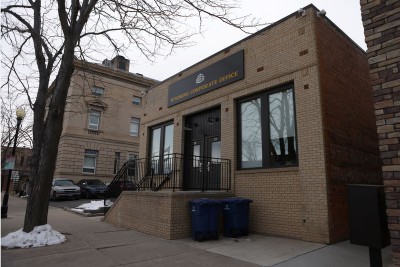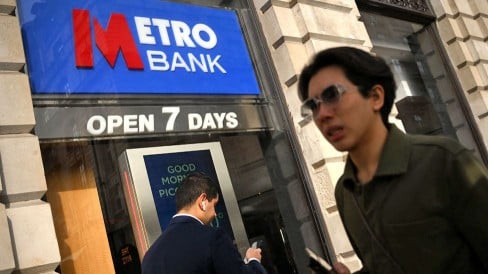
The recent cost of living crisis has led to painful choices for many households facing soaring food and energy prices.
In addition, the higher interest rates deployed to tackle rising prices have caused problems for many mortgage holders, tenants and businesses.
But recent figures showed pay rises are now matching the cost of living, and interest rates are on hold for now.
However, that doesn't mean all of us will see a rapid improvement in our fortunes.
Although many will be hoping the current squeeze on finances is coming to an end, there are several reasons why some may yet be worse off.
Jobs and wages
Workers' attempts to get pay rises that match outgoings have been helped by employers anxious to attract and keep staff in the face of skills shortages. But that's changing. As higher interest rates add to the pressure on businesses, more than 200,000 jobs were shed between May and July.
The rise in unemployment so far has been relatively modest, but it's gathered momentum and will probably increase further. There is always a lag between interest rates changes and bosses making hiring decisions.
Already, surveys show new pay deals moderating in recent weeks, also reflecting expectations - voiced by the Bank of England, the Treasury and independent economists - that inflation, which measures how prices change over time, will carry on falling.
Yet even the Bank is forecasting inflation will remain above its 2% target next year - meaning that prices will keep rising.
Food is one area where we've seen the most stubborn inflation. A shop that cost 拢60 last year is more than 拢70 now.
Those price rises should slow, but analysts warn the era of cheaper food may not return. Businesses saw their profit margins squeezed by higher costs last year and may look to build them back up.
Tax
Even if pay keeps pace with prices from here, and even if you scored a sizeable rise, ripping open your payslip may not have given you a warm glow.
Enter the "stealth tax". The government has opted not to increase the threshold at which different rates of income tax become payable in line with inflation since 2021. As incomes grow, that's helped create more than two million new income taxpayers since 2021 - and pulled 1.3 million people into the higher rate (40p) income tax bracket.
Don't expect tax relief soon. Current plans have the measure continuing until 2028, bumping up the number of taxpayers and tax bills. The chancellor also indicated this week that we can't expect tax cuts in November's Autumn Statement, as he focuses on meeting his self-imposed financial rules.
Taking tax changes and rising prices into account, the Resolution Foundation, an independent think tank focused on improving living standards, says the income of the typical working-age households will be 4% lower by 2024 than it was 2021. That may not improve before 2025.
With the government's cost-of-living payments also due to end after the winter, those on below average incomes could be hit hardest. That group, the think tank claims, could see incomes after tax and inflation falling by a further 1% between 2024 and 2025.
Borrowing costs
The rise in interest rates has felt like an inexorable slog for some, with mortgage holders in particular in the direct line of fire in the battle against inflation.
About half of homeowners with a mortgage, and a higher proportion of landlords with loans, have seen monthly repayments rise - typically by hundreds of pounds.
Whether the Bank of England has now finished hiking rates, or has merely paused, many more may face similar pain.
The governor of the Bank of England has signalled that interest rates are destined to stay high for some time, and it's financial markets' expectations where rates will go that shape the cost of fixed-rate mortgage deals.
About 400,000 borrowers are on fixed-rate deals that are due to finish before the end of this year, with 1.6 million on deals expiring next year. Those people will move onto products with much higher rates, and could see their repayments jump.
Image source, Getty Images
Analysts at Oxford Economics say total debt repayments in 2024 are typically set to take up almost four times as much of households' budgets as they did in 2021. Repossessions are expected to rise, although protective measures should keep them very low compared to past downturns.
So it takes a while for the impact of previous rate hikes to feed through to people's pockets and, therefore, to house prices. Economists reckon prices could fall by a further 5% in 2024, but high mortgage rates still make it a challenge to jump on or up the housing ladder.
The difficulties many, particularly young people, have faced in buying are one reason why the proportion of households who hold a mortgage has actually dropped to below a third. Those renting instead are already facing pressures - rents in London, for example, are rising at their fastest rate since at least 2006 as landlords' costs soar too. As some of those landlords sell up, the availability of rental properties could be hit.
The other reason for the drop in the proportion of households with a mortgage is the increase in those - typically older - who own outright. They are also more likely to be among those who built up hefty savings during the pandemic, insulating them against the shock of recent years. It's one reason why spending on non-essentials has held up. But with interest rates on hold, they're unlikely to see savings rates rise further.
With so many likely to see their budgets remaining under pressure, consumer spending - the core part of our economy - could take a knock. Many economists are concerned about the prospects for growth.
Some voters could be feeling that greater strain just as a general election moves into view. They'll be looking to politicians for answers on how they intend to improve their lot.
What can I do if I can't pay my debts
- Talk to someone. You are not alone and there is help available. A trained debt adviser can talk you through the options. Here are some organisations to get in touch with.
- Take control. Citizens Advice suggest you work out how much you owe, who to, which debts are the most urgent and how much you need to pay each month.
- Ask for a payment plan. Energy suppliers, for example, must give you a chance to clear your debt before taking any action to recover the money
- Check you're getting the right money. Use the independent MoneyHelper website or benefits calculators run by Policy in Practice and charities Entitledto and Turn2us
- Ask for breathing space. If you're receiving debt advice in England and Wales you can apply for a break to shield you from further interest and charges for up to 60 days.
Tackling It Together: More tips to help you manage debt






